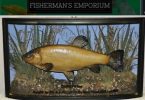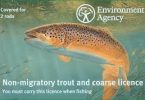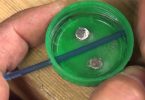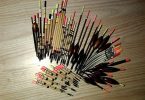WORKING on the Westcountry’s morning newspaper in Plymouth had its advantages, even though editorial staff, like printers, rarely got away from the sweatshop before the small hours.
Even then there were plenty of occasions when we kicked on to the Polish Club, where everyone was surprisingly keen to welcome us as long-lost brothers, instead of going home as we ought to have done.
We drank firewater vodka which had unpronounceable names and a kick like a mule and played ruinous games of spoof – but that’s all by the by because when you came round you always had time on your hands until the next shift, and if the tides were right a couple of boats in Sutton Harbour would take you out beyond the breakwater ‘to fish for the boat’, which meant the skipper sold the catch to pay for his diesel.
Sometimes, if you just had a snatch of sleep, you could get out to the Eddystone – and more often than not your would find yourself with members of a keen police fishing club on these trips because they had similar anti-social hours and could play like us journalists while everyone else was at work.
All these excursions were usually in the off-season because at holiday times the boats found holidaymakers a more lucrative market than dyed-in-the-wool fishermen. They paid handsomely for trips round the bay and a chance to jiggle out a few mackerel.
Running for cover
On one occasion a couple of us from the paper and a few coppers had a go at getting to the Eddystone while our boatman sucked his teeth and muttered about the rising wind and closing weather. Pretty soon, and short of our objective let alone any fish, we were scurrying for port with giant following seas which loomed higher then the boat’s stern, especially when the water shallowed and the wave lengths shortened as we nosed towards the Breakwater.
With some relief we made it inside the protection of this giant structure in one piece. Here, by contrast with the weather ‘outside’ it was positively balmy, wave-free and the breeze hardly ruffled a hair. And for those who do not know, there are some great marks with some very good fish on them in this sheltered haven, we were not all that disappointed. The only major hazard you have to contend with is being run down by Her Majesty’s Navy, lean grey frigates sliding in and out of the dockyards as duty called.
Switching to light tackle (we had started up rigged for reef pollack, conger and ling) some tried for bass while others hoped to get a nice mullet. It was slow, but it wouldn’t do to think the area fishless. From the elevation of the Hoe I once watched a school of four dolphin fishing across this very spot. They came in at one end of the breakwater and swam out at the other, and as they made their way across there were shoals of fish – mainly the above mullet and bass – flying everywhere.
So we persevered, catching the odd one or two, but as everyone who goes boat fishing knows slack times are when the tall tales come out.
A red-faced skipper
Policemen are a fund of very good stories, and journalists have a few too: a lot of them wouldn’t bear repeating because many of the characters might still be alive today, and recognisable.
However on this occasion our boatman got the most laughs for his contribution. It was all about one of those beautiful spring days when the calm sea sparkles and the fresh, green meadows are gently stroked by a balmy breezes as they sweep to the red cliff edges. All’s well with the world, the sun is in the sky and spring is very much in the air.
“It was a party of chapel ladies, see,” he said. “And I’d given them all a nice cup of tea while we turned our back on Plymouth so to speak. I’d passed round some binoculars for those who don’t bring them and we could look back while I pointed out the landmarks, the Citadel, Smeaton Tower and so on.
“Then I turned their attention west, over Edgecumbe, where there’s that lovely little church at Maker sitting all on its own out in a field. I swept my own glasses on ahead, then stopped, ‘cos I’d seen something that really puzzled me, something I really couldn’t make out.
“I said out loud, ‘Well, I’ll be blowed – I wonder what that is?’, and before I knew it all my ladies had seen where I was looking and swept their glasses round too.
“It was a large circle, quite odd, and in the middle there was something moving, something I still couldn’t quite see…
“Then, all of a sudden, I realised what it was. It was a flock of sheep, all standing in a perfect circle, looking in at what was going on …voyeurs , like, because in the middle, laid out on the grass, was this young couple going at it like I don’t know what, both of them stark b….ck naked and obviously certain they were not being overlooked, not by humans anyway.
“I did not know where to put myself for a minute, but thinking quick I pointed t’other way, out to sea and said: ‘And out there, look now, is the famous Eddystone Rock lighthouse’, an’ bit by bit they drew their eyes away.
“Me, I was red-faced all the way in. I mean, really red-faced, you can imagine. But they were very good, they didn’t say a thing about it. In fact quite a few of them smiled as I helped them off the boat – and to cap it all I got the best tips I ever had!”
Ted Lamb
Journalist Ted Lamb trained with Angling Times (1960-69) and is author of The Penguin Book of Fishing and The Bait Book (David and Charles). He was founding editor of Sea Angler in 1972 and is currently editor of a local free weekly in the Forest of Dean after working (and fishing ) for British and Australian newspapers during his long career. Fishing titles on Amazon Kindle include Brassribs (the story of a carp), Fishing Magic – all about angling for Boys and Girls, and One Last Cast (verse). Details on www.ted-lamb-books.co.uk or www.amazon.co.uk








